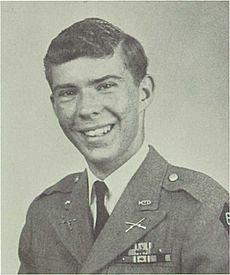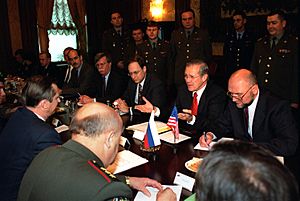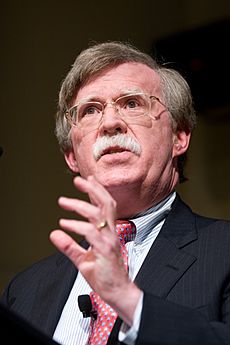John Bolton facts for kids
Quick facts for kids
John Bolton
|
|||||||||||||||||||||||||||||||||||||||||||||||||||||||||
|---|---|---|---|---|---|---|---|---|---|---|---|---|---|---|---|---|---|---|---|---|---|---|---|---|---|---|---|---|---|---|---|---|---|---|---|---|---|---|---|---|---|---|---|---|---|---|---|---|---|---|---|---|---|---|---|---|---|
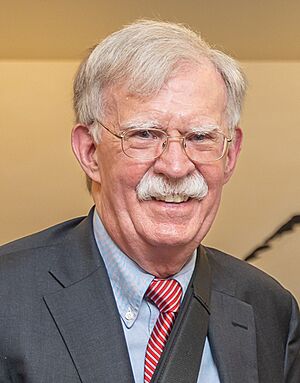
Bolton in 2023
|
|||||||||||||||||||||||||||||||||||||||||||||||||||||||||
| 26th United States National Security Advisor | |||||||||||||||||||||||||||||||||||||||||||||||||||||||||
| In office April 9, 2018 – September 10, 2019 |
|||||||||||||||||||||||||||||||||||||||||||||||||||||||||
| President | Donald Trump | ||||||||||||||||||||||||||||||||||||||||||||||||||||||||
| Deputy | Nadia Schadlow Ricky L. Waddell Mira Ricardel Charles Kupperman |
||||||||||||||||||||||||||||||||||||||||||||||||||||||||
| Preceded by | H. R. McMaster | ||||||||||||||||||||||||||||||||||||||||||||||||||||||||
| Succeeded by | Robert C. O'Brien | ||||||||||||||||||||||||||||||||||||||||||||||||||||||||
| 25th United States Ambassador to the United Nations | |||||||||||||||||||||||||||||||||||||||||||||||||||||||||
| In office August 2, 2005 – December 31, 2006 |
|||||||||||||||||||||||||||||||||||||||||||||||||||||||||
| President | George W. Bush | ||||||||||||||||||||||||||||||||||||||||||||||||||||||||
| Preceded by | John Danforth | ||||||||||||||||||||||||||||||||||||||||||||||||||||||||
| Succeeded by | Zalmay Khalilzad | ||||||||||||||||||||||||||||||||||||||||||||||||||||||||
|
|||||||||||||||||||||||||||||||||||||||||||||||||||||||||
| Personal details | |||||||||||||||||||||||||||||||||||||||||||||||||||||||||
| Born |
John Robert Bolton
November 20, 1948 Baltimore, Maryland, U.S. |
||||||||||||||||||||||||||||||||||||||||||||||||||||||||
| Political party | Republican | ||||||||||||||||||||||||||||||||||||||||||||||||||||||||
| Spouses |
Christine Bolton
(m. 1972; div. 1983)Gretchen Smith
(m. 1986) |
||||||||||||||||||||||||||||||||||||||||||||||||||||||||
| Children | 1 | ||||||||||||||||||||||||||||||||||||||||||||||||||||||||
| Residences | Bethesda, Maryland, U.S. | ||||||||||||||||||||||||||||||||||||||||||||||||||||||||
| Education | Yale University (BA, JD) | ||||||||||||||||||||||||||||||||||||||||||||||||||||||||
| Signature |  |
||||||||||||||||||||||||||||||||||||||||||||||||||||||||
| Military service | |||||||||||||||||||||||||||||||||||||||||||||||||||||||||
| Allegiance | |||||||||||||||||||||||||||||||||||||||||||||||||||||||||
| Branch/service |
|
||||||||||||||||||||||||||||||||||||||||||||||||||||||||
| Years of service | 1970–1976 | ||||||||||||||||||||||||||||||||||||||||||||||||||||||||
John Robert Bolton, born on November 20, 1948, is an American lawyer and diplomat. He has worked as a consultant for the Republican Party and as a political commentator. He held important roles in the U.S. government. These included serving as the 25th United States Ambassador to the United Nations from 2005 to 2006. He also served as the 26th United States National Security Advisor from 2018 to 2019.
Bolton worked for Presidents Ronald Reagan, George H. W. Bush, George W. Bush, and Donald Trump. He is known for his strong views on foreign policy. He often supports military action and changes in leadership in other countries. He has written a best-selling book about his time in the Trump administration, called The Room Where It Happened.
Contents
- John Bolton's Early Life and Education
- John Bolton as Under Secretary of State (2001–2005)
- John Bolton as Ambassador to the United Nations (2005–2006)
- John Bolton as National Security Advisor (2018–2019)
- John Bolton's Work as a Commentator and Activist
- Concerns About John Bolton's Handling of Documents
- John Bolton's Political Views
- Personal Life
- Images for kids
- See also
John Bolton's Early Life and Education
John Bolton was born in Baltimore, Maryland, on November 20, 1948. His mother, Virginia Clara, was a housewife. His father, Edward Jackson, was a fireman. John grew up in a working-class area. He earned a scholarship to the McDonogh School and graduated in 1966.
He then attended Yale College, where he earned a Bachelor of Arts degree in 1970. He also studied at Yale Law School from 1971 to 1974, earning a law degree.
Military Service During the Vietnam Era
During the time of the Vietnam War, Bolton joined the Maryland Army National Guard in 1970. He later served in the United States Army Reserve for two years. He completed his military service in 1976.
Early Career as a Lawyer
After law school, Bolton worked as a lawyer in Washington, D.C.. He was an associate at Covington & Burling from 1974 to 1981 and again from 1983 to 1985. He also worked as a partner at Lerner, Reed, Bolton & McManus from 1993 to 1999. Later, he was a lawyer at Kirkland & Ellis from 2008 until 2018.
Working for Presidents Reagan and George H.W. Bush
Bolton held several government jobs during the presidencies of Ronald Reagan and George H. W. Bush. He worked in the State Department, the Justice Department, and the U.S. Agency for International Development (USAID).
His roles included:
- Assistant Secretary for International Organization Affairs at the State Department (1989–1993).
- Assistant Attorney General for the Civil Division (1988–1989).
- Assistant Attorney General for the Office of Legislative Affairs (1985–1988).
- Assistant Administrator for Program and Policy Coordination, USAID (1982–1983).
- General Counsel, USAID (1981–1982).
- Commissioner for the United States Commission on International Religious Freedom (1999-2001).
John Bolton as Under Secretary of State (2001–2005)
From 2001 to 2005, John Bolton served as the Under Secretary of State for Arms Control and International Security. In this job, he focused on preventing the spread of dangerous weapons.
He worked on agreements to prevent Americans from being sent to the International Criminal Court (ICC), which the U.S. does not recognize. Bolton said leaving the ICC was a very happy moment for him.
Efforts Against Dangerous Weapons
Bolton played a key role in stopping a 2001 meeting about biological weapons. This meeting aimed to strengthen a UN agreement. He believed the plan would risk U.S. security by allowing inspections of American sites.
In 2002, Bolton gave a speech called "Beyond the Axis of Evil." He added Cuba, Libya, and Syria to the list of countries President Bush had called the "Axis of Evil." He said these countries supported terrorism and might be trying to get dangerous weapons.
Bolton also worked to stop the trafficking of dangerous weapons and materials. This was part of the Proliferation Security Initiative.
Diplomacy and International Relations
Bolton was known for being direct in his diplomatic work. Some people found his style challenging. However, officials in the Bush administration believed his strong stance helped him negotiate effectively. He received praise for his work on the Proliferation Security Initiative. This was a voluntary agreement supported by many countries.
Claims About Cuba's Programs
In 2002, Bolton claimed that Cuba had a secret biological weapons program. He also said Cuba was working with Libya and Iran. These claims were made before former President Jimmy Carter visited Cuba.
Some experts and intelligence analysts disagreed with Bolton's claims. They said there was not enough evidence to support them. The Bush administration later softened its stance on Cuba's alleged biological weapons program.
John Bolton as Ambassador to the United Nations (2005–2006)
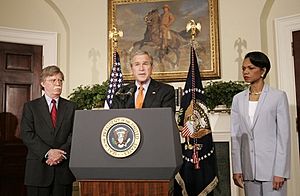
On March 7, 2005, President George W. Bush nominated John Bolton to be the United States Ambassador to the United Nations. Bolton had previously expressed strong opinions about the UN. He once said that if the UN building lost ten stories, it wouldn't make a difference.
Challenges to His Nomination
Bolton's nomination faced strong opposition from some lawmakers. They were concerned about his past statements and his diplomatic style. Some felt he was too critical of the UN.
Because of these concerns, the Senate could not agree to confirm him. President Bush then used a "recess appointment" on August 1, 2005. This allowed Bolton to serve as ambassador temporarily. A recess appointment lasts until the next session of Congress ends.
His Time at the United Nations
During his time at the UN, Bolton was seen as a controversial ambassador. He worked to reform the UN, especially the United Nations Human Rights Commission. He believed this commission included countries that abused human rights.
Bolton also opposed the proposed new UN Human Rights Council. He felt it did not go far enough to fix the problems. He wanted significant changes, not just small ones.
End of His Service
In November 2006, President Bush tried to nominate Bolton again for full confirmation. However, with the Democratic Party gaining control of Congress, it became clear he would not be confirmed.
On December 4, 2006, Bolton announced he would step down from his role. His temporary appointment ended on December 9, 2006.
Support for Bolton's Work
Many colleagues and supporters praised Bolton's efforts. They sent letters to the Senate, highlighting his dedication and diplomatic skills. Some believed he was brave in trying to fix problems at the UN.
John Bolton as National Security Advisor (2018–2019)
Consideration for the Role
In 2016, during his presidential campaign, Donald Trump mentioned Bolton as a possible choice for Secretary of State. Bolton later confirmed he was being considered for this and other roles in the Trump administration.
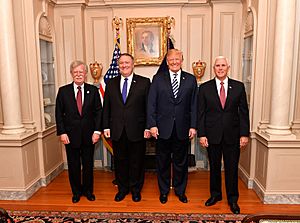
In February 2017, President Trump interviewed Bolton for the National Security Advisor position. The role first went to H. R. McMaster. However, in March 2018, Trump announced that Bolton would replace McMaster. Bolton started his new job on April 9, 2018.
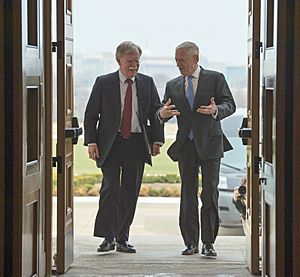
Key Actions as National Security Advisor
As National Security Advisor, Bolton pushed for the U.S. to leave the Iran nuclear deal. President Trump withdrew from the deal in May 2018.
Bolton also criticized the International Criminal Court (ICC). He said it threatened American independence and security. He stated the U.S. would oppose any ICC attempts to prosecute American service members.
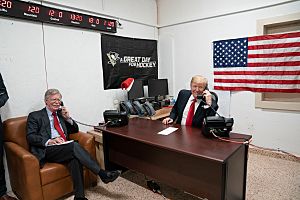
He also asked the Pentagon to consider military options against Iran. This reflected his long-standing strong views against Iran's leadership.
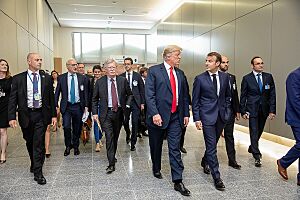
Bolton changed how policy debates happened within the National Security Council. This contributed to President Trump's decision to withdraw U.S. troops from Syria in January 2019.
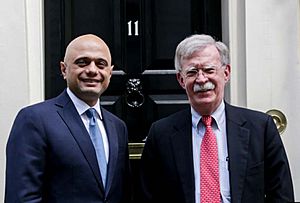
Departure from the Role
On September 10, 2019, President Trump announced that Bolton's services were no longer needed. Trump cited many disagreements with Bolton. Bolton, however, stated that he offered to resign on September 9. He said Trump told him to discuss it the next day. Bolton later clarified that he resigned on his own.
After leaving the White House, Bolton returned to his role as a senior advisor for an investment company.
John Bolton's Work as a Commentator and Activist
Bolton has been active in conservative politics and media for many years. He was executive director of the Committee on Resolutions for the Republican National Committee from 1983 to 1984. Since 2006, he has been a paid contributor for Fox News. He also served as a senior fellow at the American Enterprise Institute, a conservative research group.
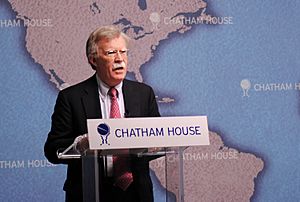
Presidential Elections
Bolton considered running for president in the 2012 United States presidential election. He decided not to run but later endorsed Mitt Romney for the Republican nomination.
He also considered running in the 2024 United States presidential election.
Work at the American Enterprise Institute
Bolton was a senior vice president at the American Enterprise Institute from 1997 to 2001. He often wrote articles criticizing the foreign policy of the Clinton administration.
After leaving the George W. Bush administration in 2006, Bolton returned to the American Enterprise Institute. He served as Director of Foreign and Defense Policy Studies from 2010 to 2018. He spoke against policies that rewarded North Korea for stopping its nuclear weapons program.
John Bolton Super PAC
In 2013, Bolton created the John Bolton Super PAC. This type of group raises money to support political candidates. His Super PAC raised millions of dollars for Republican candidates in various elections.
After Bolton became National Security Advisor in March 2018, his Super PAC temporarily stopped its political activities.
Concerns About John Bolton's Handling of Documents
In October 2025, John Bolton faced charges related to how he handled government documents. This followed an investigation into his memoir, The Room Where It Happened.
Background of the Investigation
In 2020, the Trump Justice Department tried to stop the publication of Bolton's book. They claimed he had not completed the necessary security review for classified information. Bolton's lawyer argued that the White House was delaying the review. This was to prevent the book, which criticized Trump, from being released before the 2020 election.
A federal judge allowed the book to be published. However, the Justice Department later opened an investigation into whether the book revealed classified information.
Search of His Homes
On August 22, 2025, law enforcement officers searched Bolton's homes in Maryland and Washington, D.C. This was part of an investigation into government documents. The search aimed to find any classified materials. Bolton was not arrested or charged at the time of the searches.
Charges Filed
On October 16, 2025, a federal grand jury filed charges against Bolton. These charges were related to his handling of government documents.
John Bolton's Political Views
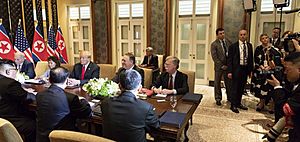
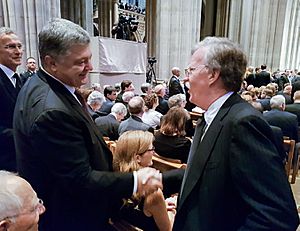
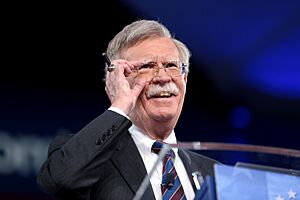
John Bolton is known for his strong conservative political views. He describes himself as a "Goldwater conservative." His political ideas are often called American nationalist and neoconservative, though he does not like the term neoconservative.
Focus on American Interests
Bolton's main belief is "Americanism." This means he puts the interests and independence of the United States first. He is cautious about international organizations and laws. He believes they can sometimes limit American freedom to act. He prefers the U.S. to act on its own when necessary, rather than always with many other countries.
Views on the United Nations
Bolton has often criticized the United Nations. He believes it can interfere with American independence. He once said that the UN is not a real power, but the U.S. is. However, he also stated that the UN can be a useful tool for American foreign policy.
Views on Europe
Bolton is critical of the European Union (EU). He believes the EU is too slow to solve problems. He also thinks it promotes policies that he disagrees with. He supported the United Kingdom's decision to leave the EU (Brexit).
Personal Life
John Bolton married Christina Bolton in 1972, and they later divorced. He has been married to Gretchen Smith Bolton, a financial planner, since January 1986. They have a daughter named Jennifer. The family has lived in Bethesda, Maryland since 1986. Bolton is a Lutheran.
Images for kids
-
Bolton, President Trump and German Chancellor Angela Merkel at the G20 Summit in Buenos Aires, December 1, 2018
-
Bolton greeting Israeli Prime Minister Benjamin Netanyahu in August 2018
-
Bolton with Israeli President Reuven Rivlin in August 2018
-
President Trump, joined by Bolton and Netanyahu behind, signs the proclamation recognizing Israel's 1981 annexation of the Golan Heights, March 25, 2019.
-
Bolton with Russian President Vladimir Putin in June 2018
-
Bolton meets with Russian Defense Minister Sergey Shoygu in Moscow in October 2018.
-
Bolton, President Trump and Chinese leader Xi Jinping at the G20 Summit in Osaka, June 28, 2019
-
Bolton with Brazil's president-elect Jair Bolsonaro in Rio de Janeiro in November 2018
See also
 In Spanish: John Bolton para niños
In Spanish: John Bolton para niños
 | William Lucy |
 | Charles Hayes |
 | Cleveland Robinson |


